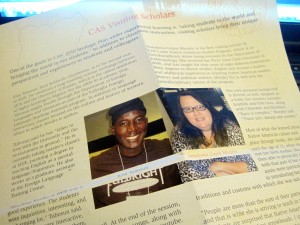Two days ago at the office, a faculty member and I sat by the computer in the language lab to put in names of students billed to take the SOPI test next week. The SOPI is a Simulated Oral Proficiency Interview that is meant to test the proficiency of said students in a language in question, this time Spanish. All, or most, of the students were Americans. To save time, I volunteered to type in the names and generate a username and password for the students while she wrote down the passwords against the names of the students so that when the time came for them to take the test, all they’d need to do would be to log in and begin.
 The problem began when she started calling the names. I – a sometimes overconfident believer in my own ability to pronounce and spell any name as long as it is pronounced correctly – stared however into the screen confused each time I wrote out what I heard of a name, and my colleague told me that I’d written a totally different thing from what is correct. First there was Shawn which I thought was “Sean”, then Tiffannie which in my mind could only have been “Tiffany”. When she called “Lindsi”, I thought she meant Lindsay, and I wrote it, only to be corrected once again that the name is written just as it pronounced, and not Lindsay. And there came the others: Kathryn, Catherine, Kathrine, Brittney, Brittany, Lindsey, Devan, Devon, Kaitlyn, Cathlyn, Caitlin, Katelynn, Elisabeth, Elizabeth, Ashlee, Ashley, Megan, Meagan, Staci, Stacy, Alexandre, Alexander, Kelli, Kelly, Halle, Haley, Jasmyne, and Jasmin. Of course, before we finished typing in all the names, I’d simply given up on trying to type them from sounds. I would listen, and then peep into the student register myself in order to see how the names are spelt.
The problem began when she started calling the names. I – a sometimes overconfident believer in my own ability to pronounce and spell any name as long as it is pronounced correctly – stared however into the screen confused each time I wrote out what I heard of a name, and my colleague told me that I’d written a totally different thing from what is correct. First there was Shawn which I thought was “Sean”, then Tiffannie which in my mind could only have been “Tiffany”. When she called “Lindsi”, I thought she meant Lindsay, and I wrote it, only to be corrected once again that the name is written just as it pronounced, and not Lindsay. And there came the others: Kathryn, Catherine, Kathrine, Brittney, Brittany, Lindsey, Devan, Devon, Kaitlyn, Cathlyn, Caitlin, Katelynn, Elisabeth, Elizabeth, Ashlee, Ashley, Megan, Meagan, Staci, Stacy, Alexandre, Alexander, Kelli, Kelly, Halle, Haley, Jasmyne, and Jasmin. Of course, before we finished typing in all the names, I’d simply given up on trying to type them from sounds. I would listen, and then peep into the student register myself in order to see how the names are spelt.
The occasion reminded me of so many instances in which my name is misspelt by many people who one would expect to know better. I remember very many exasperating moments in school in Nigeria where an overzealous teacher or secretary would insist on putting another “n” somewhere in-between my last name just because some other variation exist with that kind of spelling. A few months ago – last year – when I returned to my home university in Ibadan to pick up my long overdue certificate, I found out that they had written my last name on it with their own spelling in mind, and they had kept it for me since 2005, waiting for me to come pick it up. Since the document itself had started to look aged from dust and poor keeping, it was very convenient for me to complain as loudly as possible that the name written on it actually doesn’t belong to me. When I was in Kenya in early 2005, I remember having a similar discussion with a friend of mine, co-traveller from Nigeria, whose last name was Olarewaju but who had almost always had to deal with people who (by their own assumption of correctness) always insisted on writing it as Olanrewaju, the most conventional spelling.

So, here I am in America – the land of the free, with liberty and a thousand name variations. It used to be hard enough to accept people’s inherent laziness to even try to pronounce one’s name as soon as they just see that it is a foreign one – even if that name is “Amory”, as my room mate from Philippines said to me a few weeks ago. All they have to know is that you are a foreigner and your name suddenly assumes a certain difficulty to pronounce that wasn’t there before. I have always attributed it to laziness and an inability to even make an effort. It’s not as if the letters of said names were brought out from the sky. I understand not being able to write down a name you hear because of ambiguities that I myself have acknowledged above, but not being able to pronounce ones already written must require a certain level of intellectual laziness.
To encounter names and variations from this new angle of spelling, for me, makes for an interesting humbling, and a realization that in the end, man’s need to confound himself with his quest for identity really transcends geographical or linguistic boundaries. This explains why, sometimes in December, the editor of a Faculty publication insisted over our email conversations that instead of writing my name as simply Kola Tubosun as I had advised, she would write it in full along with the tone marks. She was afraid that, by asking her to write my name without the marks, I was compromising the integrity of a meaningful name for the convenience of American pronunciation. We eventually settled on a compromise: “Kola Tubosun, born Kóláwọlé…” and that was how it appeared in the publication. Her insistence touched me and I’ve been thinking about it ever since.
Now, having been on the many sides of this naming experience, I don’t know how to conclude. Maybe there’s not even a nice summary to it, except that when next I meet someone whose name is Chris, it might be better to ask him first if his begins with a “C” or a “K”.
1
Temie at http://YourWebsite
HA. The foreign name problem. That is how my Temi got another e added to the end, because my 14 year old self thought it cool. sigh. And gosh, my last name… its 4 letters, its extremely simple to pronounce (in my view). Yet it is mispronounced EVERY SINGLE TIME by a non nigerian. That is how i figured that its not necessarily laziness, but the reluctance to cause offense by butchering the poor name. Now, my own pet peeve is the inevitable, “oh your name is so pretty” comment. I should be flattered but I am not.
Nice article Kola. Keep it up.
Posted at January 23, 2011 on 5:32pm.
2
Kola at http://www.ktravula.com
I’ve always been curious about the famed mispronunciation by American citizens encountering a name for the first time. Understandable in many instances where the names had too many consonant clusters that didn’t lend themselves to easy pronunciation at first, but inexcusable in cases where the names are actually very easy to guess just from how it is spelt. Temie is one of those easy examples. So is Kola (and I have winced a few times when someone asked me how to pronounce it. At least try.) I had a room mate last semester whose name is Amory. But simply because he’s from the Philippines, many Americans he has met have asked him to please guide them in pronouncing his name! Now, how do we explain that?
Posted at July 14, 2011 on 4:16pm.
3
Clarissa at http://clarissasbox.blogspot.com
When I was an undergrad, professors would distribute papers by calling out the students’ last names: “Harris, Jones, Green, Tremblay. . . erm . . .” When I heard the “erm”, I knew it was me, so I’d raise my hand immediately. “Oh,, thank God, I didn’t have to try to pronounce it!” the professor would say. 🙂
Posted at January 24, 2011 on 10:53pm.
4
Kola at http://www.ktravula.com
This was funny. I know a few classmates of mine who had similar issues because their names were long and came from a different culture. I can totally relate.
Posted at July 14, 2011 on 4:12pm.
5
Temitayo at http://YourWebsite
Many of my writings in university, well not school work had my name written as Theryor (with the ami ohun on the vowels!)…Hehehe. Now I look back, what got into me? Some exuberance, I guess
Posted at January 25, 2011 on 11:56pm.
6
Kola at http://www.ktravula.com
I’ve heard of very many cases where Nigerians funkify their names when they get to the US just for the ease of pronunciation. Lanre becomes Larry. Chukwu becomes Chucks and Ikechukwu becomes Ike (rhyming with “like”) among many others. That’s insane. Why do we choose to infantalize Americans by condescending to insist that they lack the faculty to learn to pronounce other people’s names? It makes no sense to me.
Posted at July 14, 2011 on 4:20pm.
7
Tomi at http://www.olaoluwatomi.blogspot.com
I love my full name but seeing it has more syllables in it than the average name, I have given up on it ever being pronounced correctly so i stick with the short form. I had a friend (Asian) learn how to pronounce my first and last names using the tonic sol fa! re me re me re mi re and mi mi re re! She did a good job
Posted at February 2, 2011 on 3:19am.
8
Kola at http://www.ktravula.com
From the tonic sol fa, I can already guess what your first and last names are. Fun. It’s easier for Asians to pronounce Yoruba words because of the presence of tones in their own languages as well.
Posted at February 27, 2011 on 11:20am.